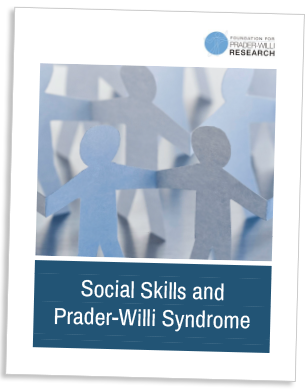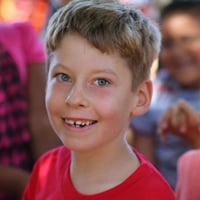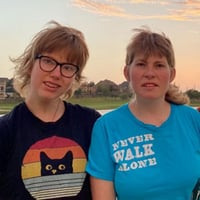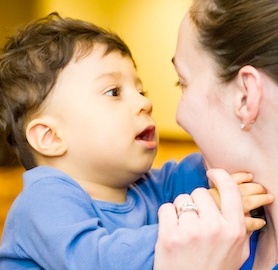
Social skills and social connections are important for all of us. The term “social skills” is not only about friendships with others but is also about problem-solving, decision-making, self-management, and perspective taking in a social situation. Difficulties with social behaviors may interfere with learning, school experiences—including teacher acceptance—and future work opportunities, and psychological well-being.

Most people with Prader-Willi syndrome need extra help learning effective social skills. There are many challenges that the person with PWS has to contend with that make developing good social skills difficult. These include hyperphagia, cognitive issues, emotional regulation difficulties, and motor planning challenges. Social skills challenges in PWS can overlap with those observed in autism spectrum disorder (ASD) but are not exactly the same.
Research is helping the Prader-Willi syndrome community better understand the social skills challenges many children, teens, and adults with PWS experience—and how to support their development.
Studies have shown that while people with PWS are often socially motivated, they may have more difficulty learning social skills through observation, which is how most typically developing children acquire these abilities. Common social difficulties in PWS include reciprocal (back-and-forth) communication, recognizing others’ emotions, empathy, and accurate interpretation of social cues. As a result, social skills often need to be taught more directly and intentionally.
Based on this growing body of research, tools such as the BOSS (Building Our Social Skills) curriculum are now available to help teens and adults with PWS practice and build everyday social skills. In addition, work is underway to develop a pretend play guide for younger children, informed by research led by Dr. Anastasia Dimitropoulos.
People with the maternal uniparental disomy (UPD) or imprinting defect (ID) genetic subtypes are more likely to have greater challenges with social skills and to be diagnosed with ASD compared to those with deletion, but research has shown that all genetic subtypes of PWS (deletion, UPD, and ID) show social challenges, and can benefit from support in developing their social skills.
Preschool and school-age children with PWS may be particularly affected by speech challenges and motor planning difficulties. Getting early intervention with speech and physical therapy can be very helpful for social skills development. Social skills difficulties in PWS can present physically, verbally, or cognitively. Following are some specific ways in which these social challenges may show up in your loved one with PWS. You may also see many of these same challenges continue through the teen and adult years.
People with PWS may look at the person’s mouth instead of their eyes during a social interaction. People with PWS also can have difficulties with physical distance with others (getting in someone’s “space bubble”).
People with PWS may have challenges with speech “apraxia” or “dyspraxia” (the brain has difficulty planning the movements needed for speech, and this may cause the person to say something different than what they meant to say). The person with PWS may also talk (a lot) about topics that may not interest others, often steering the conversation back to the favored topic.
People with PWS may have difficulty considering others’ feelings, not because they don’t care but rather because they have difficulty putting themselves in someone else’s shoes; as part of this they may have difficulty understanding how what they say affects others (e.g., saying in front of friends at a party, “I like this gift better than all the others”).

Another key area of social development that is specific to young children and connected to social cognition skills is pretend or imaginary play. Research shows that pretend play skills are related to positive outcomes in areas that people with PWS struggle with, such as social awareness, emotion regulation, and cognitive flexibility (limitations of which can be seen as rigidity and repetitive behaviors). Pretend play is important because it helps children learn to take in others' perspectives, transfer knowledge from one situation to another, and balance their own ideas with those of others. These skills lay a foundation for higher-order cognition and thinking skills.
Research published in 2021 by Dimitropoulos, et al., showed that a six-week remote “pretend play skills” intervention can improve social and cognitive skills in school-age children with PWS. These skills were especially improved when other ‘“players” were included in the play situation. These skills have also been shown to improve for some children with PWS after parents are trained to incorporate more pretend play in interactions with their child.
Another factor that is unique to PWS and likely affects the development of social skills is hyperphagia, which can start during the elementary school years. One theory is that hyperphagia may negatively affect social skills because it may deplete cognitive and social resources that children with PWS need in order to engage well in social interactions (e.g., if they’re hungry or thinking about food, they may not be as focused on playing or trying to understand what their friend is doing or feeling).
A study funded by FPWR is examining this issue in PWS by exploring social reward circuitry, which has to do with how much value we place on social behaviors (e.g., a smile, praise, positive connection with another person or peer). It may be that as hyperphagia sets in, there is a shift in the brains of people with PWS away from social reward to prioritize other things of value.
When looking to improve the social interactions of preschool and school-age children with PWS, here are some appropriate target areas:

Older teens and adults with PWS often continue to struggle in the social arena, but the degree to which they have challenges varies by age, cognitive development, and genetic subtype.
Research has shown that teens and adults with PWS have ongoing challenges with reciprocal or back-and-forth communication and with recognizing emotions.
According to a 2019 study by Dykens et al., it appears especially challenging for some people with PWS to be able to clearly distinguish negative emotions in others such as sadness, anger, and fear. The participants did make gains in detecting social cues over the two-year study period, but they still had difficulty accurately perceiving the intentions of others (e.g., judging sincere vs. insincere intentions).
Another recent study exploring this difficulty in recognizing and processing emotions (Debladis et al., 2019) found that all 39 adults with PWS in their study took longer than typical people to process facial cues for emotions. Using eye-tracking technology, they also found that people with PWS by UPD, in particular, spent less time looking at the eyes, which is the part of the face people typically focus on when talking and interacting with someone. People with PWS by UPD spent more time looking at the nose/mouth region.
In another study, Debladis et al. examined processing of voices and sounds and found that adults with PWS had significantly greater difficulty in this area compared to typically developing people. Specifically, people with PWS had greater difficulty identifying non-voice sounds, and those with the UPD subtype had greater challenges identifying voices than those with the deletion subtype. However, all of the people with PWS, regardless of subtype, struggled with voice and sound processing compared to typical controls with slower processing times.
These recent studies highlight differences in the way people with PWS process incoming social information both visually and auditorily. Difficulty processing vocal and facial expressions of emotion has a direct impact on the ability to succeed in the social arena. These studies highlight potential targets for the development of new interventions focused on improving social connections for those with PWS.

An additional recent research study in this area explored a social skills intervention for teens and young adults with PWS. This research group at Vanderbilt conducted an online virtual social skills intervention using an evidence-based curriculum modified specially for PWS. For the study, small groups of people with PWS met (via Zoom) with a facilitator several times per week for 10 weeks. Preliminary results indicate that social skills can be improved using a curriculum that focuses on interpreting facial cues to others’ emotions and intentions and encourages appropriate social interactions among group members with real-time feedback during the sessions. Homework, repetition, and practice of skills between sessions appeared to be crucial for learning these social skills.
The study’s findings included the following:
We gratefully acknowledge the contributions of Anastasia Dimitropoulos PhD and Elizabeth Roof MA for their input on this project.


The Foundation for Prader-Willi Research (federal tax id 31-1763110) is a nonprofit corporation with federal tax exempt status as a public charity under section 501(c)(3).



The mission of FPWR is to eliminate the challenges of Prader-Willi syndrome through the advancement of research and therapeutic development.
Copyright © 2020. All Rights Reserved. Terms of Use. Privacy Policy. Copyright Infringement Policy. Disclosure Statement.